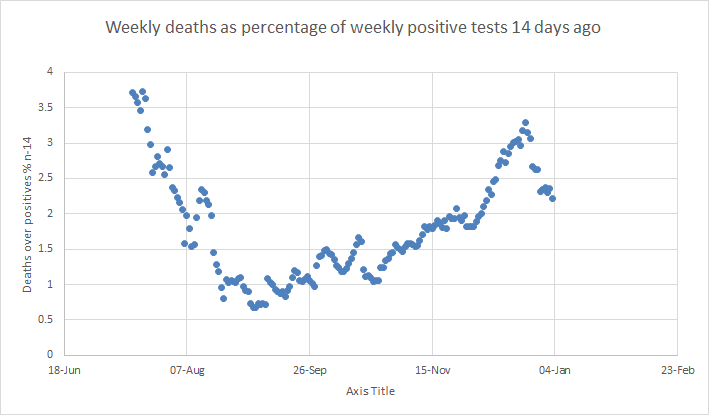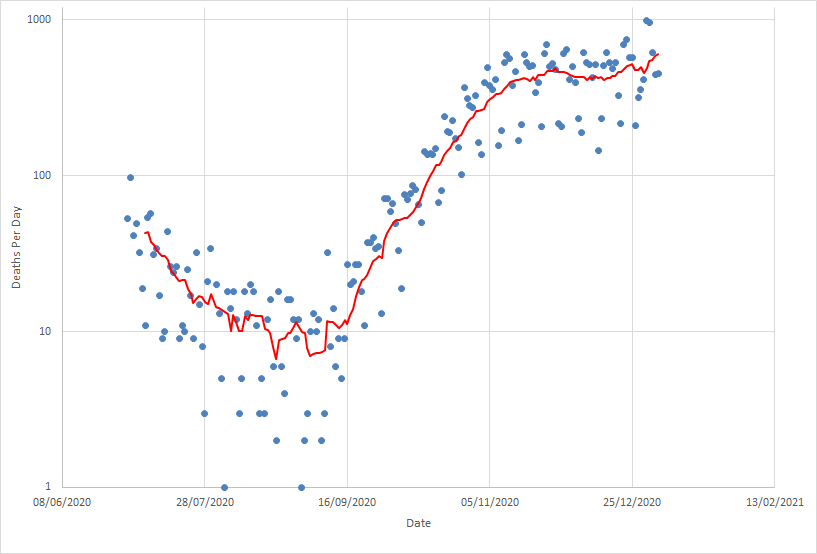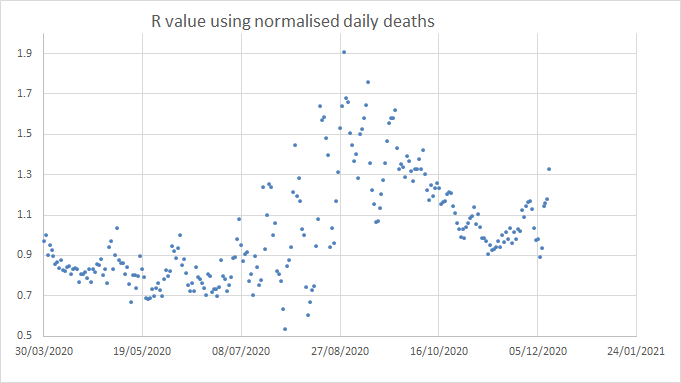Lots of confusion over how the second wave of Covid has happened. When and how it started. Allow me to explain. July. This started in July. (1)
So early, you say? Yes. There are three things you need to do to see this. Firstly, you've got to look at testing data. And realise that to a very great extent is has been crap. We can't use recorded positive tests to judge when it started (2)
The ratio of positive test results to deaths should be constant, at least at one time delay, and it isn't. The proportion of cases we have found isn't constant. It has never been constant. It has got better when we got more testing, but its hugely inconstant (3)
So all we've really got that we can do maths with is deaths. The down side of that is we can't get an R value thats up to date, we can only get that at a 23 day (the average time it takes Covid to kill) delay. How does that work? Well we've got two bell curves. (4)
The time for peak infectivity, the middle of that bell curve is 5 days. The time to die, the average time it takes from then, is 18 days. The ratio of deaths between 18 and 23 days, simply divide deaths 18 days ago by 23 days ago, is R at that point. (5)
Quite literally the cohort who died 5 days ago infected those who died today. Divide 1 by the other and you get R at a 23 day delay. (6)
Now, you can see if you drop a log on the deaths total, you've got a clear inflection point when we stopped going down, data got noisy and deaths started rising. End of July (7)
And calculating R from that gives us a very clear picture. R started rising at the start of July. It hit a peak, slowed, fell far too slowly, and started rising again. (8)
All the way through the recovery from the first wave we saw intermittent peaks in R, which correlated with VE day, shops reopening/mass demos, loosening lockdown (those days with footage of crowded beaches), etc. (9)
Those who have been following this feed will remember that deaths tracked these events at nearly exactly 23 day delays, on each occasion. So, what happened at in early July? The pubs opened on the 4th (10)
R continued to rise through Eat Out, Help Out. It went on rising until the October. When people started to pay attention again and it started to go down. And then tiering came in during October, and slowed R. But not enough, it barely got down to 1 (11)
Lockdown 2 slowed it further, but barely. R was roughly constant, clustered around 1 for a while, until early December. What happened then? Lockdown 2 ended. (12)
Look, this isn't rocket science. This is simple maths, and if I can do it there's an analyst advising Downing Street who has done the same sums. They know this. They've seen it. They've been aware of this since Summer like we all have been (13)
And that means we've only really got one inescapable conclusion. They've known all along that their strategy was failing. But they don't care. It is inconceivable that anything else is happening here (14)
They know that their policies have created massive peaks of infection. They know that those peaks have created mountains of dead. They also know that the economic cost of this is massively greater than handling the pandemic more effectively (15)
It is a near inescapable conclusion that they know all of these things. So do we really now have to ask ourselves an almost unthinkable question - why have the handled this so badly? (16)
We've known what prevents this all going wrong all along. We've know what makes it all go to shit for just as long. We've concrete examples of comparable nations handling this much better (17)
Why is it that Johnsons Conservative government have repeatedly ignored both science and precedent and chosen the wrong options, at such enormous cost in lives and money? (18)
There's a design to this. I can't believe they're so uniquely incompetent. Cock up rather than conspiracy as a principle stretches too thin here. What, precisely, is their purpose? (fin)

 Read on Twitter
Read on Twitter




